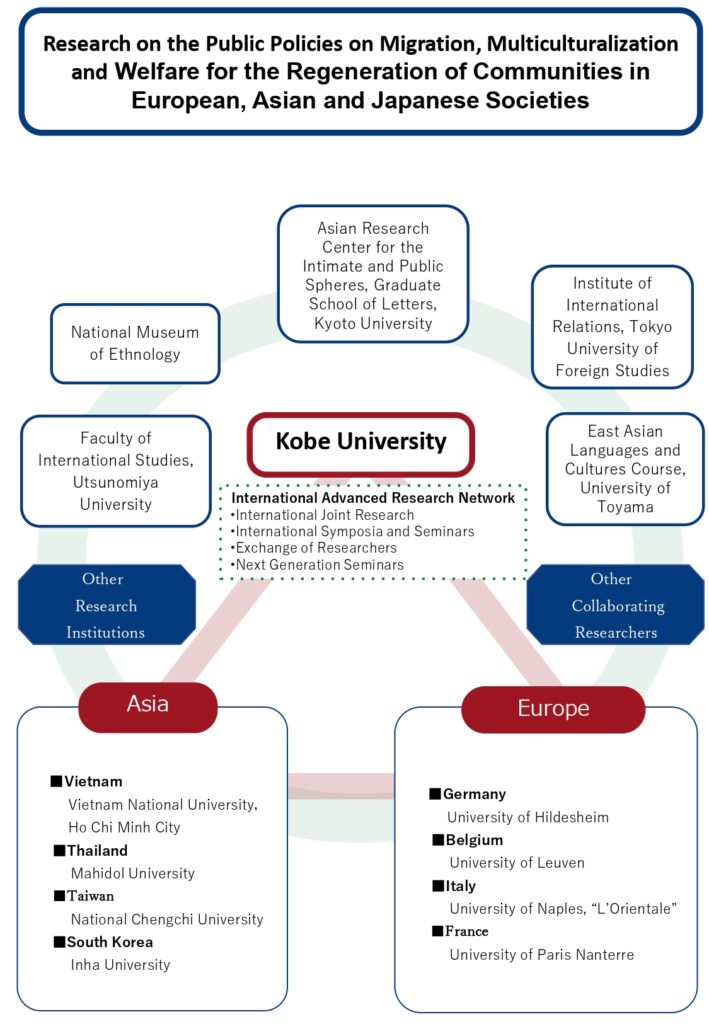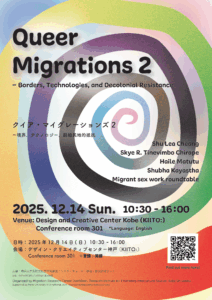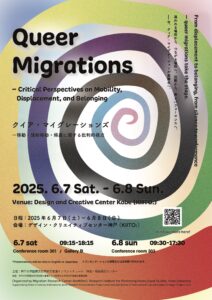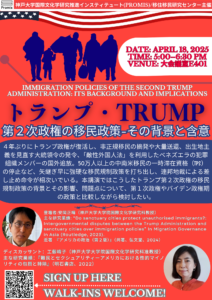

Overview
“Research on the Public Policies on Migration, Multiculturalization and Welfare for the Regeneration of Communities in European, Asian and Japanese Societies” of Graduate School of Intercultural Studies, Kobe University, has been adopted as the Core-to-Core Program (A: Advanced Research Networks) by the Japan Society for the Promotion of Science. Centered around the Research Center for Promoting Intercultural Studies, Kobe University, this program will be conducted from 2016 to 2020 with the cooperation of eight foreign universities, four Japanese universities, and one institute along with other research departments at Kobe University, in order to build a world-class research base related to migration, multiculturalization, and welfare policy.
Purpose of Research Exchange
As typically seen in Japan and the European Union (EU), modern society is currently facing three rapid changes that are closely connected with one another. These fears concern the rise of social, political, and economic instability within the receiving society due to intensified migration, divisions in the local community due to the advancement of multiculturalization, and an erosion of citizens’ sense of solidarity with one another, which is critical for welfare redistribution and which is leading to fluctuations in the welfare state. Coupled with the long-term population dynamics of an aging society and a declining birth rate, these three societal changes not only threaten the stability and maintenance of a developed society but also confront Japan and the EU with serious concerns about the human rights and welfare of migrants and their families.
Japan shares these specific problems, which are related to developed countries, with the EU; further, it has also committed to close political and economic relationships with countries in the Asian and Pacific Ocean region, which includes agreements to accept migrant workers. Other Asian countries, meanwhile, are undergoing social transformations due to large-scale migrant worker movement. Under an ever-changing globalized environment, therefore, scholars in Japan, EU, and Asia now have the responsibility to investigate and share innovative and constructive knowledge from a variety of perspectives, so as to create the policies necessary for building stable, new living areas that extend beyond traditional communities.
This project aims to establish a research center that is connected to EU and Asia in Kobe, which has been a multicultural area since the Meiji era, in an effort to construct an international research system that addresses this unexplored problem. This is an issue that lies at the intersection of the humanities and social sciences, from both an empirical and a theoretical standpoint. For five years, from 2016 to 2020, the Kobe University’s Research Center for Promoting Intercultural Studies, in collaboration with eight overseas universities, four Japanese universities, and one research institution along with other research departments at Kobe University will conduct this project and construct a world-class research center for the study of migration, multiculturalization, and welfare policies.

Background and Significance
The Groundbreaking Project and Its Academic Significance
Without even considering the recent rapid increase in the number of migrants and refugees in Europe from its surrounding regions, we can say that developing countries face the following three social changes: migration, multiculturalization, and fluctuations in the welfare state, coupled with the demographic trend of a declining birthrate and aging population, that are causing serious concerns about societal sustainability in Japan and the EU. Cross-border, large-scale human movement is not only problematic for border patrols in the receiving countries but also raises problems related to political, social, and financial instability. Particularly in provincial cities, multiculturalization overlaps with changes in industry structure, the outflow of the younger generation, and the decline of central cities; creates friction between the receiving society and migrants; and is assumed to divide local communities. There has also been cautious voices that multiculturalization not only leads to instability and stronger conservatism of the receiving society but also threatens citizens’ sense of solidarity, which is the foundation of a welfare state. From the perspective of human security, however, there is a need for an urgent, systematic treatment of migrants and their families to ensure their basic human rights.
In response to these recent global challenges, not only academia and the political sphere in Japan but also scholars worldwide at various stages of their professional development and policy-makers will obtain great benefits through the process of bringing together scholars from Japan, Asia, and Europe, conducting joint investigations and discussions, resolving differences in opinion and background, and providing knowledge and proposals related to the building of new, stable communities and living areas. Since the 1868 opening of Japan’s borders, the city of Kobe has been a pioneer in catalyzing the process of multiculturalization and modernization in Japan. By serving as a research center that links researchers from the EU, Asia and Pacific region, the Kobe University Graduate School of Intercultural Studies is making an important contribution to the development of research on global multiculturalization.
The Significance of This Project
For the EU, the political and economic collapse in nations around the EU and the influx of migrants and refugees that followed gave rise to the loss of borderlines, which is both a domestic and international security issue, and which can be termed “borderless instability.” To alleviate anxiety about migrants among their citizens and to build local communities that include minorities, EU’s receiving countries have proposed social integration policies that aim at achieving both multiculturalization and a welfare state. In Asia, through the Economic Partnership Agreement, the Philippines, Indonesia, and Vietnam are sending nurses and care worker candidates to Japan, and Thailand is also requesting that Japan accept care worker candidates. The externalization of care work that can be performed across borders symbolizes the change in reproductive labor in Japan. In Japan, due to the increase in the number of South American migrant workers settling there, the number of foreign students (migrants’ children) is rapidly growing; however, this phenomenon is giving rise to new problems related to serious inequality in education as there are regions in which the percentage of foreign students who go on to high school and university is extremely low.
Given this social background and the current situation, it is extremely important for us in Japan, which faces similar social issues as the EU, particularly with regard to receiving migrant workers, to resolve our social issues; therefore, we promote research exchange and host scholars from Asian countries, while also deepening our collaboration with European scholars who have a deep understanding of the EU’s social integration policies.
Academic Results Anticipated from This Project
Within the next five years, this project will constantly implement joint research and studies and engage in scholar exchanges as well as host international symposia and workshops about twice a year at locations around the world. Through research presentations and joint discussions, this project will continue to address the question “What policies and knowledge do the societies in Japan, EU, and Asia require to build new, sustainable living areas (communities) that transcend traditional communities through an understanding of the advancement of globalization and migration?” Japan and the EU nations, which are currently receiving societies for migrant workers and are also developed countries, certainly share many societal problems; however, they also have great differences in their political situations and understanding based on differences in their geopolitical influence and history. Therefore, through the greater promotion of joint research and opinion exchanges, we can expect that the level of mutual academic understanding, knowledge and policy recommendations will deepen.
For example, in EU, although considerable political destabilization in regions surrounding the EU has given rise to the development of problems that are mainly related to immigration, the current situation of fear concerning declining birth rates and aging populations and the emptying of regional cities and population outflow require a response at the EU level, one that goes beyond individual nations, regarding welfare and social policies. To promote the harmonious coexistence of immigrants and different cultures, maintain the welfare state system, and reduce the “anxiety” factor, “Europeanization” is being promoted; this means that there is a requirement to create international standards within Europe for various policies. Determining the problems themselves, through answering questions such as “Can norms created transnationally be applied to Asia without any changes? If not, what are the factors related to this? If so, what modifications are necessary?” raise serious matters for debate. Through the efforts of an international network of scholars charged with investigating questions, such as “Can a created-norms model offer any direct suggestions for Asian researchers?” and “Based on a comparison of the EU and Asia, should Japan play any role within Asia?”, perhaps there will be an opening on the horizon in terms of new understanding and agreement between Japan, Asia, and EU.
Research Exchange Plan
The social, political, and economic upheaval that has been produced by rapidly increasing migration and multiculturalization does not adequately fit into surveys and studies on a national level, and we need earnest and prompt joint research and discussions based on an international research network that includes both the “sending society” and the “receiving society”. For this project, Asian scholars, who can primarily represent the position of migrant workers, and Japanese/European scholars, who are part of the receiving society, will conduct the following three research exchanges after sharing the state of contemporary problems through joint research.
①Joint Research
Every year, when scholars gather at one of the Core Institutes, they collaborate to conduct both qualitative and quantitative empirical research targeting various actors from their respective societies, including migrants and their families and supporters, policy makers, public and private businesses, and citizens. In Japan, for example, when foreign workers settle and become established in Kobe, Toyama, and Tochigi Prefectures, a variety of issues emerge in these areas, and researchers work together to conduct field surveys with the assistance of domestic cooperative agencies. By mutually sharing the domestic perspective in Japan and the viewpoint of societies sending the migrant workers, the study can explore the construction of a more stable and sustainable multicultural community.
②Seminar
At the symposia and workshops held regularly each year at the Core Institute, scholars mainly compile research announcements and joint discussions on common themes such as “migration, welfare nation states, and human rights” and the “revival of regional cities facing situations of multiculturalization”; further, they also gather knowledge on sociology, politics, anthropology, gender studies, international relations, and cultural policy studies. Scholars address any differences in understanding concepts, such as the transformation of reproductive labor and new urban cultural policies and perform policy research to build a more constructive multicultural community. Additionally, in conjunction with the annual International Symposium, we hold the Next Generation Seminar based on the initiative of young researchers as a friendly competition site for postdoctoral and doctoral students.
③Researchers' Exchange
Traditionally, research exchanges have been constrained, particularly by budget issues. However, due to increased efforts toward scholar exchanges, particularly between Kobe University and various institutions in Asia and Europe, scholars are able to participate not only in joint research and studies at their respective home institutions but also by contributing as a teacher or mentor to the training of other researchers; moreover, they strengthen collaboration in the areas of both research and education and aim to further enhance and improve the functioning of their universities.






